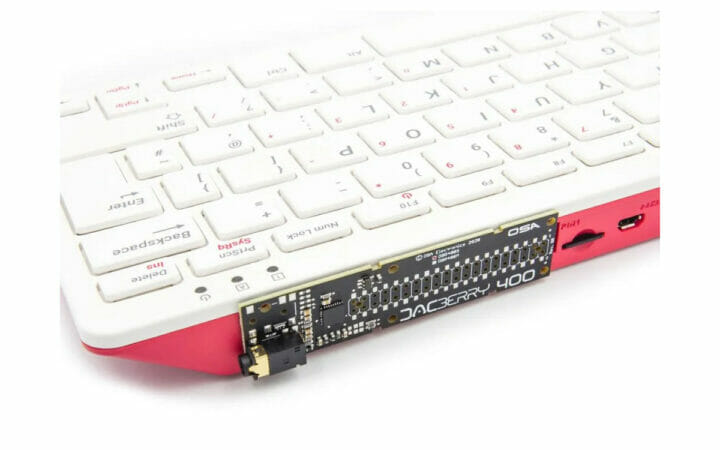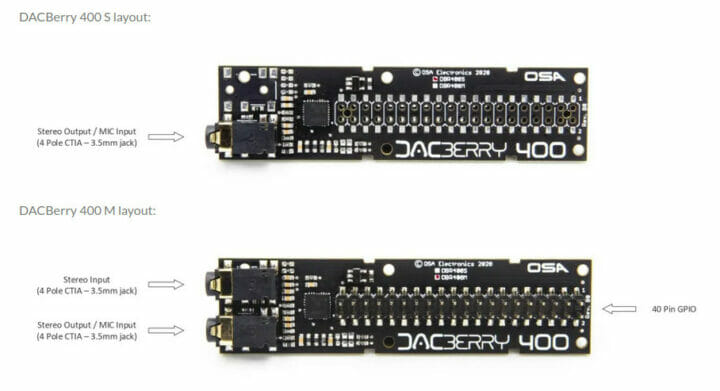The Raspberry Pi 400 is a keyboard PC with most of the features of Raspberry Pi 4 SBC, with one of the exceptions being the lack of AV port. But you can now add a 3.5mm audio jack to the Raspberry Pi 400 through the DACBerry 400 S expansion board that connects to the 40-pin GPIO header.
It’s a neater way than using a cheap USB audio dongle with microphone and headphone jacks, as it takes less space, and does not occupy any of the USB ports from the Raspberry Pi 400, and it does not prevent you from using the GPIO header. It’s also better suited for headphones with both microphone input and analog stereo audio output into a single jack, and probably comes with better audio quality than the low-cost USB dongles.
 DACBerry 400 S (DBR400S) specifications:
DACBerry 400 S (DBR400S) specifications:
- Gold-plated 3.5mm headset/headphone jack (mic in – stereo out)
- DAC SNR 102dB @ 96kHz
- ADC SNR 92dB @ 96kHz
- THD+N 0.003% / -92dB @ 1kHz
- Integrated DSP with 3D Effects, EQ and De-Emphasis
- Ultra low-noise LDO for analog power rail
- Signals from GPIO header – I2C, PCM, 5V, GND (See pinout diagram below)
- Low-Noise design with isolated Digital and Analog parts
- Power Supply – 5V directly from GPIO header
- Dimension – 77 x 20 x 15 mm
- Weight – 30 grams
- Compatibility – Raspberry Pi 400, and board with 40-pin GPIO connector, including Raspberry Pi, Asus Tinker Board, ODROID-C4, etc…

The maker of the board, Spain-based DSA Electronics, says the DACBerry 400 S is compatible with OSMC, RuneAudio, Volumio, Moode, PiCorePlayer, PiMusicBox, OpenELEC, and other audio programs, meaning it’s probably software-agnostic… YOu just need to run the following script for installation in Raspberry Pi OS or other supported operating systems:
|
1 |
curl https://www.osaelectronics.com/get/dacberry400.sh | bash |
A closer look at the board reveals there’s also a DACBerry 400 M model as well, which adds an extra 4-pole CTIA audio jack for stereo input. A getting started guide shows how to record audio with Audacity, after running the installation script.
 The DACBerry 400 S is currently sold for 19.95 Euros, but I could not find the M model for sale yet. That’s significantly more expensive than low-cost USB audio dongles going for under $5, so it’s up to you if the space saved, and potentially higher audio quality warrant the higher price tag.
The DACBerry 400 S is currently sold for 19.95 Euros, but I could not find the M model for sale yet. That’s significantly more expensive than low-cost USB audio dongles going for under $5, so it’s up to you if the space saved, and potentially higher audio quality warrant the higher price tag.
Via Minimachines

Jean-Luc started CNX Software in 2010 as a part-time endeavor, before quitting his job as a software engineering manager, and starting to write daily news, and reviews full time later in 2011.
Support CNX Software! Donate via cryptocurrencies, become a Patron on Patreon, or purchase goods on Amazon or Aliexpress





Guess I am being a party pooper but what about those HDMI to HDMI splitters with audio/headphones out. They have been around for ages ?
Also does the display you are using have a audio jack.
Bluetooth earphones maybe?
That’s not the way RPi fans like it, I guess. You need to have a pagoda of GPIO extension boards sticking out of its back to be able to consider yourself a true RPi fan.
I had a great laugh reading this 🙂 You forgot also a large amount of unused “just in case” modules in your drawer!
While I understand that research, development and support has it’s cost, I think that this piece of hardware is a bit overpriced for electronics that can be built with nearly 10 euros buying parts with single piece consumer pices. Despite this, it’s a very elegant solution.
Ah, the old “curl piped into bash” install method.
I really need to create a fake project that works like this and installs rootkits on machines so that this practice stops. But it’s not even sure it would change anything 🙁
Do you really fear a script somewhere sitting on the Internet you can read beforehand? What about all those crappy OS images supplied by companies or hobbyists that are downloaded by millions of SBC/ARM users without giving a f*ck every other day? If these OS images aren’t generated from scratch but manually assembled all this ‘curl piped into bash’ stuff might’ve already happened multiple times…
The difference is that I don’t care when such commands results in ruining *their* development machine or just their image. I do care when it can ruin mine. And yes, before picking a script from github I do read it, I don’t launch it if it’s totally unreadable as usually it’s a good indication that the author has no idea what it does. And in any case I don’t run them under sudo. I don’t particularly fear the nasty things hidden in them, mostly the basic mistakes that a coworker did in the past:
dir=$(ls results*)
rm -rf “$dir”/
That caused some fun the first and only time it was launched from the results directory itself… We all write bugs, but I don’t want others’ bugs in quickly written scripts to wipe my data.
Why focussing on you as an expert? This here is about a hardware add-on that obviously needs some software adjustments too. There are 4 ways to achieve the latter:
1) write a tutorial with shell commands
2) put script available via https:// –> pipe into bash
3) provide a clickable application wrapper doing the very same
4) provide a modified OS/Raspbian image containing the mod
1) apparently doesn’t work for vast majority of SBC users (or Linux users in general). 2) is the best option since allowing experienced users to inspect the stuff they’re about to execute. Both 3) and 4) are much much worse compared to 2) but for whatever obscure reasons only 2) triggers comments this would be ‘insane’.
So what? Please remember we’re talking about the RPi/ARM world here where it’s ‘common sense’ to download whole OS images from somewhere on the Internet nobody has any change to really audit.
These OS images are mostly made by people who can not even spell the word ‘security’ and where stuff like ‘curl piped into bash’ might have happened already multiple times.
The “modern” internet owes a huge apology to Microsoft and ActiveX.